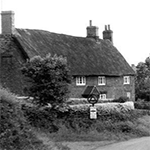Above the main field at Butterwell Farm in Byfield was a smaller field. On one side was a continuation of the dry stone wall that separated our land from that of Mr Peter Thompson, on the other the extensive gardens that my mother worked to create. At the bottom ,separating this land from the main field, was a giant old barn which contained a wooden three-seater lavatory seat among other gems. At the top there was another barn which in turn formed one half of one side of the yard behind our house. We we worked hard to turn the barn into a fox proof hen-house. and then started to build up a flock of chickens with the odd bantam picked up along the way, for fun.
This was part of the self sufficiency drive led by my mother. I think we offered the chickens a good home. The barn was secure. Our cat, to whom I will turn later but who had various names including Jesus Christ, ensured there were few rodents. The field was large enough and had a good patch of nettles by the dry stone wall allowing hens to lay enough eggs which were undetectable, to frustrate a boy sent out to collect breakfast. Why would a hen lay eggs in the nettles and not in the nice straw we laid down in the hen house?
Most of the chickens had no name. They were all the same red colour and so would it be racist to say that they all looked the same to me? I think that in the 1970s such an observation was not a hate crime. Such birds had a good life until one day they were unlucky enough to be picked up by father for a quick neck wring, plucking and a move to the pot.
At this point, any snowflake or Islington urbanite readers who had hitherto assumed that chickens were made by Waitrose and was unaware of how they are killed, may feel horrified and nauseated, I apologise not. Our chickens had a good, open air sort of life and their end was very quick. Perhaps not giving them names depersonalised the killing experience for my father who was the sole executioner.
There were one or two birds that had names. There was a bantam cockerel with black feathers and a fine red and orange plumage whose job was to "look after" the two bantam hens. He was, for some reason, named Mr Peter Thompson after the neighbouring farmer. Please note that in any conversation it was always Mr Peter Thompson not Peter Thompson. Again, there is no rationale or reason for this. Neither of the bantam ladies ever produced bantam chicks. Was Mr Peter Thompson (the bantam) something of a confirmed bachelor? He lived his pointless existence of laying no eggs and siring no heirs but just eating the food he was given, until a ripe old age and a natural death. Bantams are too small for the pot.
The chickens did now and then produce young, having hidden eggs in places which we could not find. In one brood there was a runt who was both small and stupid, somehow in the end contriving to drown himself in the stream which at the height of summer was so shallow that meeting such a death must have required real effort. My father named this poor runt Bill Whitehead after a colleague of his at the University of Warwick.
This was unfair. Bill was my father's closest friend and a real novelty in liberal arts academia, that is to say a staunch conservative. He and my father used to make a great show of crossing picket lines whenever their lazy colleagues in the English department, such as Germaine Greer, actually bothered to pitch up on campus on the basis that there was a strike to support.
Born in America, Bill was so right wing that he did not wait for the draft, he volunteered for the army saying he wanted to go to Korea. His wish was denied and so, much to his disgust having wanted to kill as many commies as possible, he dodged front line action and ended up at Warwick. But he was pretty short and it was his size that meant that a dimwitted runt chicken, which was a real contender for a Darwin Award, was named after him.
There was also the cockerel who was called Andrew Bowden after the vicar of Byfield who was a celebrated collector of rare breeds of hen. I am fairly sure that he is credited with rediscovering one species that was thought to be extinct and he had a large collection up at the vicarage. These days CofE vicars have their minds on higher things such as gender equality, fighting global warming or Donald Trump and worrying what to buy their husband's for Valentine's Day. Andrew was a rather more old fashioned sort of vicar, married to a woman, believing in God and that sort of thing.
I am not sure why the cockerel was named after the vicar but my parents soon realised that cockerels were a waste of space. It was far cheaper to buy laying hens than to try to breed and anyhow Andrew Bowden did not seem terribly keen on the ladies either. Perhaps that was a sign of things to come for CofE vicars across the land. And thus one day, in the name of efficiency, my father had to wring the vicar's neck as the pot beckoned.


